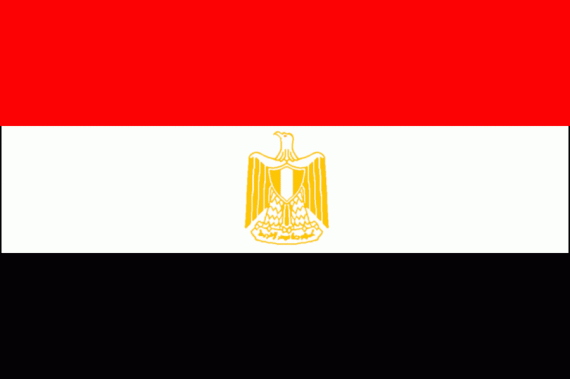Looking at the (Suspended) Egyptian Constitution
So, what are the constitutional provisions for presidential resignations in Egypt?
 At one point it this ongoing process, I thought that the reason Mubarak finally got around (after 31 years) to appointing a Vice President was to create a path for succession. However, in consulting the (now suspended, it would seem) Egyptian Constitution, I understand that a) the line of succession was actually to the Speaker of the People’s Assembly (lower chamber of parliament) and then to the President of the Supreme Constitutional Court (see Article 84 below). The Vice President only takes control if the President temporarily cannot fulfill his duties.
At one point it this ongoing process, I thought that the reason Mubarak finally got around (after 31 years) to appointing a Vice President was to create a path for succession. However, in consulting the (now suspended, it would seem) Egyptian Constitution, I understand that a) the line of succession was actually to the Speaker of the People’s Assembly (lower chamber of parliament) and then to the President of the Supreme Constitutional Court (see Article 84 below). The Vice President only takes control if the President temporarily cannot fulfill his duties.
Indeed, Mubarak’s attempt yesterday to stay in the office whilst delegating powers to Suleiman makes sense in that context as what Mubarak was trying to do yesterday was basically to take a leave of absence without resigning (see Article 82 below).
If Mubarak wanted to follow constitutional procedure, he would have had to have submitted a letter of resignation to the People’s Assembly, with the Speaker becoming interim President. The Assembly would then have chosen a new President within 60 days (see Article 84 and 76 below).
I can find no constitutional provision allowing the military to take over executive powers.
It is quite clear that the relevant constitutional provisions have not been followed, which make the moves by the Egyptian military extraconstitutional (i.e., beyond the constitution—a nice way of saying “illegal”). This is why I would call what has happened “a coup.”
Here are the pertinent portions of the Chapter Five of the Egyptian Constitution:
Art.82:
In case the President of the Republic , due to any temporary obstacle, is unable to carry out his functions, he shall delegate his powers to a Vice-President.
Art.83:
In case of resignation, the President of the Republic shall address his letter of resignation to the People’s Assembly.
Art.84:
In case of the vacancy of the Presidential office or the permanent disability of the President of the Republic, the Speaker of the People’s Assembly shall temporarily assume the Presidency. In case the People’s Assembly is dissolved at such a time the President of the Supreme Constitutional Court shall take over the Presidency on condition that neither one shall nominate himself for the Presidency. The People’s Assembly shall then proclaim the vacancy of the office of President . The President of the Republic shall be chosen within a maximum period of sixty days form the date of the vacancy of the Presidential office.
Understand, too, that the process to elect the president under this document is not one that envisions multi-candidate elections:
Art.76:
The People’s Assembly shall nominate the President of the Republic . The nomination shall be referred to the people for a plebiscite. The nomination for the President of the Republic shall be made in the People’ Assembly upon the proposal of at least one third of its members. The candidate who obtains two thirds of the votes of the members of the People’s Assembly shall be referred to the people for a plebiscite . If he does not obtain the said majority the nomination process shall be repeated two days after the first vote. The candidate obtaining an absolute majority of the votes of the Assembly members shall be referred to the citizens for a plebiscite. The candidate shall be considered President of the Republic when he obtains an absolute majority of votes cast in the plebiscite. If the candidate does not obtain this majority, the Assembly shall propose the nomination of another candidate and the same procedure shall follow concerning his candidature and election.






Sounds right to me. But also see Article 139:
“The President of the Republic may appoint one or more Vice-Presidents define their jurisdiction and relieve them of their posts. The rules relating to the calling to account of the President of the Republic shall be applicable to the Vice-Presidents.”
Interesting that the appointment of a Vice-President is discretionary, and the Vice-President could be more generally delegated Presidential responsibilities in perhaps more ambiguous manner than under Article 82.
Indeed. But for the delegation to remain valid, Mubarak would have had to have remained president.
Assumption of power by the military is in any case extralegal. The bigger problem is the constitution clearly requires amendment to deal with the situation, and the power to propose amendments rests with the president, which Egypt no longer has.
Suleiman announced on February 8th that a committee had been established to handle the amendments proposed by Mubarak, but who is guiding the committee now?
«It is quite clear that the relevant constitutional provisions have not been followed, which make the moves by the Egyptian military extraconstitutional (i.e., beyond the constitution—a nice way of saying “illegal”). This is why I would call what has happened “a coup.”»
If we are discussing if what happened today/yesterday in Egypt was a coup or a legal/constitutional change of power (like it was the discussion about Honduras), you wil probably be right.
However, my impression is that the polemic about “02/11/2011 Egypt” is not “it is a coup or a legal move?”, but more “it is a coup or a people’s rebellion/revolution?”.
Personally, I think that is a mix of the two, like in Philippines and Haiti in 1986.
Btw, perhaps is not 100% correct to say that “the state is under the control of the military, not the protestors”, because:
1 – since 25 January, in many neighborhoods and perhaps cities, now there are “people’s committees” in parallel with official state machine
2 – and, more important, it is not clear if the generals (a expression more correct than “the military”) have real power to rule without the cooperation of the (ex?)protesters.
Perhaps a good analogy with Egypt could have been Ecuador 2000, if the rebels had maintained the power.
@Miguel:
Someone else asked me for an analogy to a Latin American case, but I couldn’t think of one.
Public trust in the military reminds me a bit of Brazil in the 1960s, but otherwise the comparison isn’t a very good one.
Venezuela 1958?
@Miguel
One major difference that comes to mind is that there were the parties that had formed in the previous democratic interlude (brief though it was) that formed the basis for a civic opposition that could form the new civilian government.